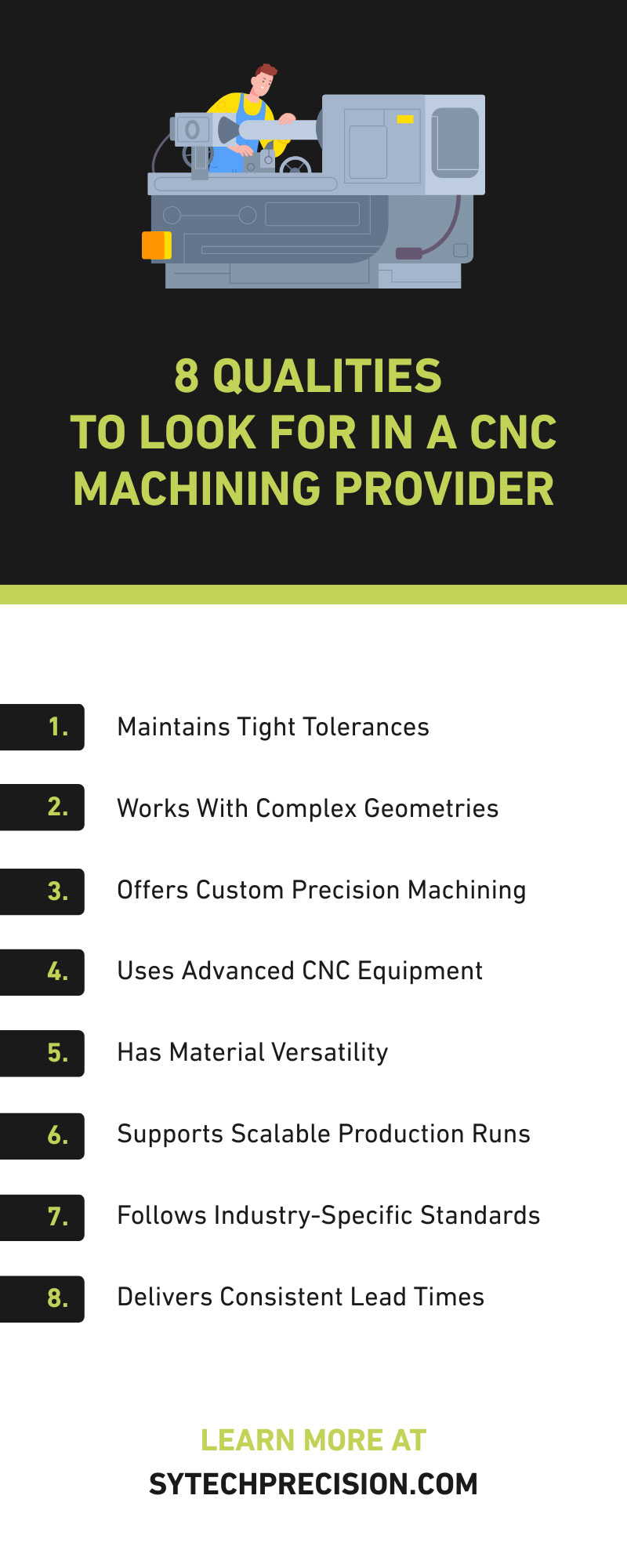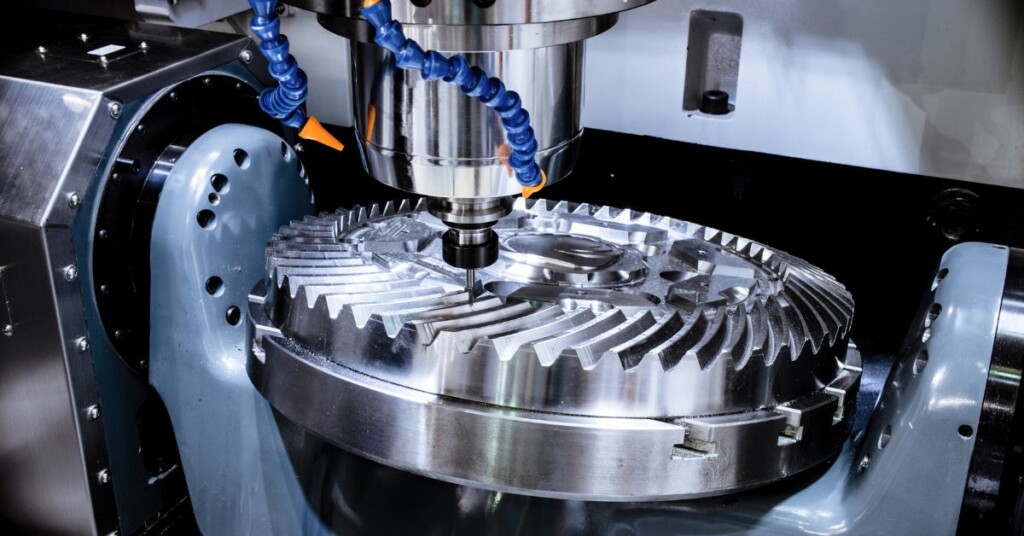If you’re not an engineer, evaluating a machining partner can feel like sorting through a foreign language. Surface finish specs, tolerance bands, machine axis counts—you don’t need to know every term, but you do need to know what impacts results. And at the end of the day, your supplier’s capability isn’t simply about what they promise. Rather, it’s about what they can repeat over time, with minimal surprises.
To help you confidently choose the right partner for your project, here are eight qualities to look for in a CNC machining provider.
1. Maintains Tight Tolerances
Precision isn’t marketing speak; it directly affects fit, function, and part lifespan. For most industrial applications, a high-quality CNC shop should consistently hold tolerances within ±0.0005 inches on milled features and even tighter on turned parts when required.
Look for a provider that uses in-process inspections and final quality audits, not just spot checks. Ask what kind of metrology equipment they rely on (CMMs, optical comparators, surface roughness testers) and how often they calibrate it. Shops that take tolerancing seriously won’t hesitate to show sample inspection reports from past projects.
Also, pay attention to how they talk about tolerances. A reliable provider will clarify where tight tolerances are needed and where loosening them could reduce cost or complexity without hurting performance.
2. Works With Complex Geometries
When your part includes irregular angles, compound curves, or tight internal features, not every shop will be equipped to handle it. This is where the difference between a production mill and a precision partner starts to show.
A capable CNC provider should be comfortable machining complex geometries across multiple planes. Think of off-axis holes, deep pockets, or wall sections thinner than 0.030 inches. Ask how they fixture multi-face parts and what simulation tools they use to anticipate toolpath complications.
More importantly, a shop that’s used to working with difficult projects will often provide design-for-manufacturability feedback during quoting. That alone can prevent costly mistakes downstream.
3. Offers Custom Precision Machining
Precision machining is one piece of the puzzle, and for many projects, tight tolerances are just the starting point. A machining partner that offers custom precision machining services can help you reduce total lead time and simplify sourcing by handling multiple production steps under one roof.
Services might include everything from secondary tapping and reaming to PEM hardware installation, powder coating, or gasketing. For example, if your part requires a form-in-place (FIP) gasket, you’ll want a shop that can apply it robotically and in-house, avoiding delays caused by outsourcing.
This level of integration becomes even more valuable at scale. Fewer handoffs mean fewer dimensional shifts, fewer opportunities for delay, and better process control across the board.
4. Uses Advanced CNC Equipment
Skill only goes so far without the right tools. High-end shops invest in newer equipment with 4- or 5-axis machining centers, live tooling, automatic tool changers, and updated software suites. These tools make it possible to hold tighter tolerances, reduce setup time, and machine more complex parts in fewer operations.
Question how often their machines are maintained and upgraded. A top-tier machine tends to lose its edge if it hasn’t been tuned in six months. And don’t overlook software. Advanced CAM platforms like Mastercam or Fusion 360 allow for tighter toolpath control, better surface finish predictions, and reduced error rates, particularly on intricate parts.
If they can walk you through how a part moves through their process, that’s usually a good sign they’re running a clean, capable floor.
5. Has Material Versatility
The most accurate machine work won’t matter if a shop can’t handle the material you need. Whether your components call for stainless steel, aluminum, copper, plastics, or exotic alloys, your provider should be comfortable sourcing and machining them to spec.
Look for a shop that’s transparent about the materials they’ve worked with in the past. You want to hear more than just “we machine steel.” Instead, they should mention 6061-T6, 17-4 PH, or Delrin and be able to talk through the tradeoffs in machining performance, finish quality, or post-processing.
Keep in mind that working with more demanding materials like titanium or Inconel requires different tooling and speeds. So, if your application involves high-heat environments, corrosion concerns, or electrical conductivity, make sure your provider has documented experience.
6. Supports Scalable Production Runs
A prototype is one thing, but producing 1,000 parts a week without sacrificing quality or speed is another. If you’re looking to establish a long-term supply partner, it helps to know how they handle scale.
A good CNC machining provider will be able to support everything from one-off R&D parts to high-volume production without compromising on tolerances or finish. Ask how they handle batch consistency. For instance, do they create and store digital toolpaths for repeatability? Do they use job travelers or production logs to track part flow?
Additionally, providers that support scalable production will often invest in pallet changers, bar feeders, and automation, which are things that improve throughput without introducing variation. Those details matter more than you might think when your order moves from dozens of parts to hundreds or thousands.
7. Follows Industry-Specific Standards
Some industries can’t afford even the smallest manufacturing slip. Medical, aerospace, defense, utilities—these sectors rely on CNC parts meeting strict certification or documentation standards.
When your parts need to meet UL, NEMA, ISO, or MIL-SPEC standards, it’s not enough for a shop to say they’ve done it before. Inquire about the quality systems they follow. Do they offer material traceability? Will they provide Certificates of Conformance or First Article Inspection Reports upon request?
Shops that take compliance seriously will already have procedures in place to track revision control, material batches, and inspection documentation. The more buttoned-up their process, the fewer surprises during production or audits.
8. Delivers Consistent Lead Times
On-time delivery is a necessity for your own production schedule. If your machining partner can’t hit quoted lead times consistently, it causes a domino effect of delays, rescheduling, and unhappy customers.
Ask how they calculate their lead times. Do they base them on real capacity data? Can they explain how rush orders are handled or how they buffer in machine downtime or material delays?
A provider that delivers consistently will often use production scheduling software and share those updates proactively. They’ll also be honest when timelines are tight, instead of overpromising and underdelivering.
Don’t Overlook What Happens After the Quote
Too many businesses treat CNC machining as a commodity—compare prices, pick the lowest bidder, and hope for the best. But poor quality or unreliable timelines cost more in the long run. That’s why these eight qualities to look for in a CNC machining provider matter so much; they help you avoid preventable setbacks and build better relationships with the vendors you rely on.
At Sytech, we specialize in precision CNC machining with a clear focus on reliability and repeatability. From high-spec UL-listed enclosures to tight-tolerance brackets, we’ve built our operation around complex needs and large-run production.
Our team can help you weigh material tradeoffs, spot cost-saving design tweaks, and navigate standards specific to your industry, whether you’re in telecom, utilities, defense, or another regulated sector. When you’re ready to talk shop, give Sytech a call. We’re happy to walk through your specs and talk about timelines, options, or installation needs before production begins.

